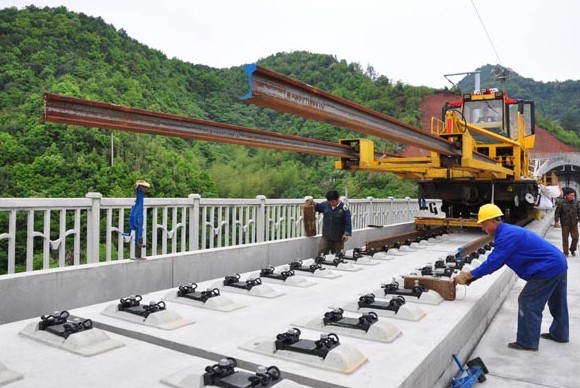

Workers lay tracks for a high-speed rail in Wuyuan county in Jiangxi province. A State Information Center report on Monday suggested speeding up investment in urban renovation and rail projects in central and western China. Hu Dunhuang / for China Daily
Solid conditions provide time and resources to deal with structural reforms, shadow banking
The International Monetary Fund forecast China's GDP will grow 7.5 percent this year and 7.3 in 2015, and the multilateral organization said it's time for the nation to focus on quality of growth.
"It's important to rein in credit growth as well as shadow banking while China's growth rate still remains well above 7 percent," said Chang-yong Rhee, Asia and Pacific department director. "We think this slowdown leads to a more sustainable path."
At a briefing by the organization on Monday where it released its regional outlook, Rhee pointed out that China is facing challenges as its leverage increased significantly after a stimulus package of 4 trillion yuan ($640 billion) was launched following the 2008 global financial crisis.
Many of those debts were channeled through the shadow banking system.
"In the short term, if credit growth and leverage mounts, it may cause problems that are difficult to handle in the future, especially when combined with a slowdown in the real estate sector."
"However, we still believe the Chinese economy has leeway to address this debt problem," Rhee said. "As long there are large fiscal resources, the government - even on the level of local authorities, which have less funds - can step in when something bad happens."
He emphasized that during meetings with high-level Chinese officials in Beijing last month, the IMF found leaders of the country understand the issue very well.
"China is addressing the leverage and shadow banking issues with a series of structural reforms," he said. "It won't be easy, but we hope problems can be solved gradually."
Separately, the State Information Center said on Monday that the nation's economy, particularly the property sector, faces strong downward pressure. The center, which is a central government think tank, said pressure will persist during the current quarter, with GDP growth of about 7.4 percent.
The report suggested implementing a proactive fiscal policy and speeding up investment in urban renovation and rail projects in central and western China. It also proposed a reduction in banks' reserve ratios to increase short-term liquidity when necessary.
"The downtrend is the outcome of tighter monetary and fiscal policies, as well as the pursuit of structural reform," the report said.
The SIC estimated retail sales will expand 12.6 percent in the second quarter, while growth in exports and imports will be about 7 percent and 6.5 percent, respectively.
It said there will be "modest" inflation this quarter, with the consumer price index up 2.3 percent and the producer price index declining 1.1 percent.
Rhee said that China is more likely to use small-scale stimulus measures, where necessary, than a large package.
"The government has learned its lessons. Instead of investing in real estate, it probably would focus on healthcare, education and other areas that don't suffer from oversupply," he said.
"The government also realizes the importance of stabilizing the property market," Rhee added. "While there is no sign of prices declining in big cities, we expect soft landings in third-and fourth-tier cities, where the authorities might try more measures."
The IMF indicated that China's slowdown will have an impact elsewhere in the region, especially economies that depend on China for final goods and services exports. Such countries might include South Korea, Malaysia and Thailand.
The IMF said that a decline in China's growth rate of 1 percentage point might cut that of Asian economies by about 0.3 percentage point. The impact on members of the Association of Southeast Asian nations is expected to be the largest at more than 0.35 percentage point.
Copyright ©1999-2018
Chinanews.com. All rights reserved.
Reproduction in whole or in part without permission is prohibited.